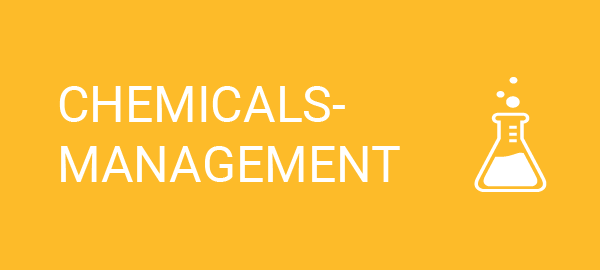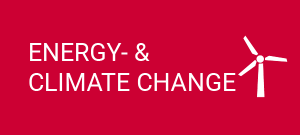A new signpost system has been in place at the BUDNI Gertigstraße shop since August 2020, making more sustainable products easily recognisable. How is the use of hazardous substances curbed at BUDNI and which products can now be filled? We asked one of the managers, Christoph Wöhlke.
The drugstore chain BUDNI is known for its environmental friendliness. This was also the focus of the branch opened in August in Gertigstraße in the Winterhude district. As a pilot store, it was equipped with a new sustainability concept. A signpost runs through the entire assortment, which uses four different signs to indicate in which areas a product is already making a positive contribution. These include the core topics: the preservation of biodiversity, a careful use of natural resources as well as freshwater and climate protection. The filling station for washing-up liquid and detergent, which is designed to save packaging, is particularly eye-catching. Here, the customer can buy a bottle once and refill it again and again. We wanted to see for ourselves! That’s why we talked to one of the BUDNI chain’s managing directors, Christoph Wöhlke, about the innovative store concept at the new branch.
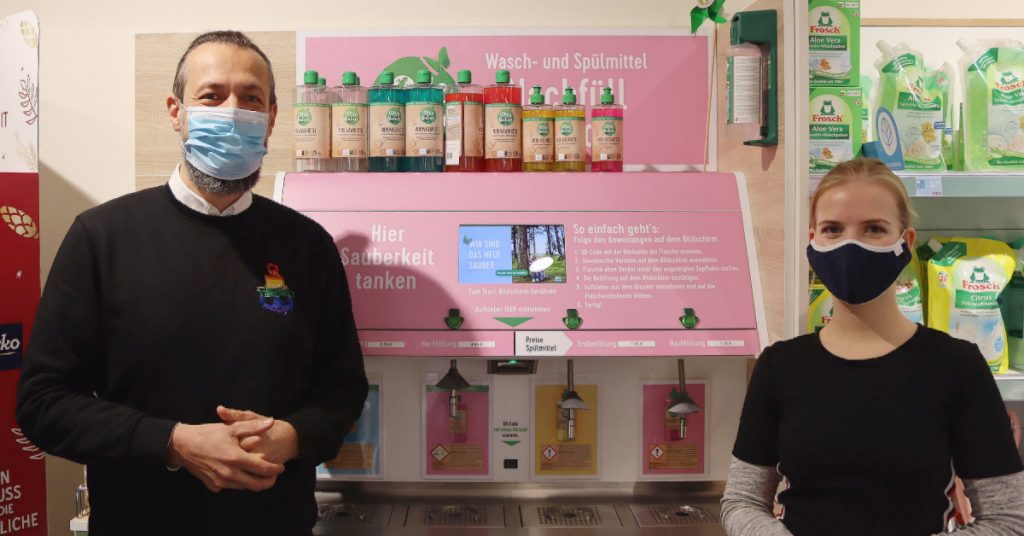
Are more sustainable products being bought?
It is essential for the success of a new concept that customers are convinced. So our first question was whether we can already observe a change in buying behaviour. „More sustainable goods are being bought than is the case in other branches,“ says Christoph Wöhlke. However, it is not always possible to distinguish cause and effect here, as very many things in the branch have been redesigned, the manager explains further.
Branches that are newly opened are equipped with the signpost right from the start. In November, for example, the second branch with the new sustainability concept opened in the Sonninquartier in Hammerbrook. Other branches will follow soon.
How were the four core sustainability criteria determined?
WWF supports as an expert advisor and partner in the commitment to a more sustainable product range for the protection of fresh water, natural resources, climate and the preservation of biodiversity. The four goals also count towards the United Nations‘ Sustainable Development Goals and are among the most important current challenges in environmental protection. According to Wöhlke, it was difficult to define the evaluation criteria at the beginning because there are very different challenges in each category. Important criteria that are taken into account in BUDNI’s guide include the ingredients of a product and the cultivation of the resources that are needed for it. These are verified by external certificates and seals. This diversity and complexity is the reason why the company wants to meet the customer’s needs with the signposts: „If consumers can make a better decision with more transparency, we see it as our responsibility to contribute to this transparency,“ explains the managing director. There are already many sustainable products in the BUDNI stores.
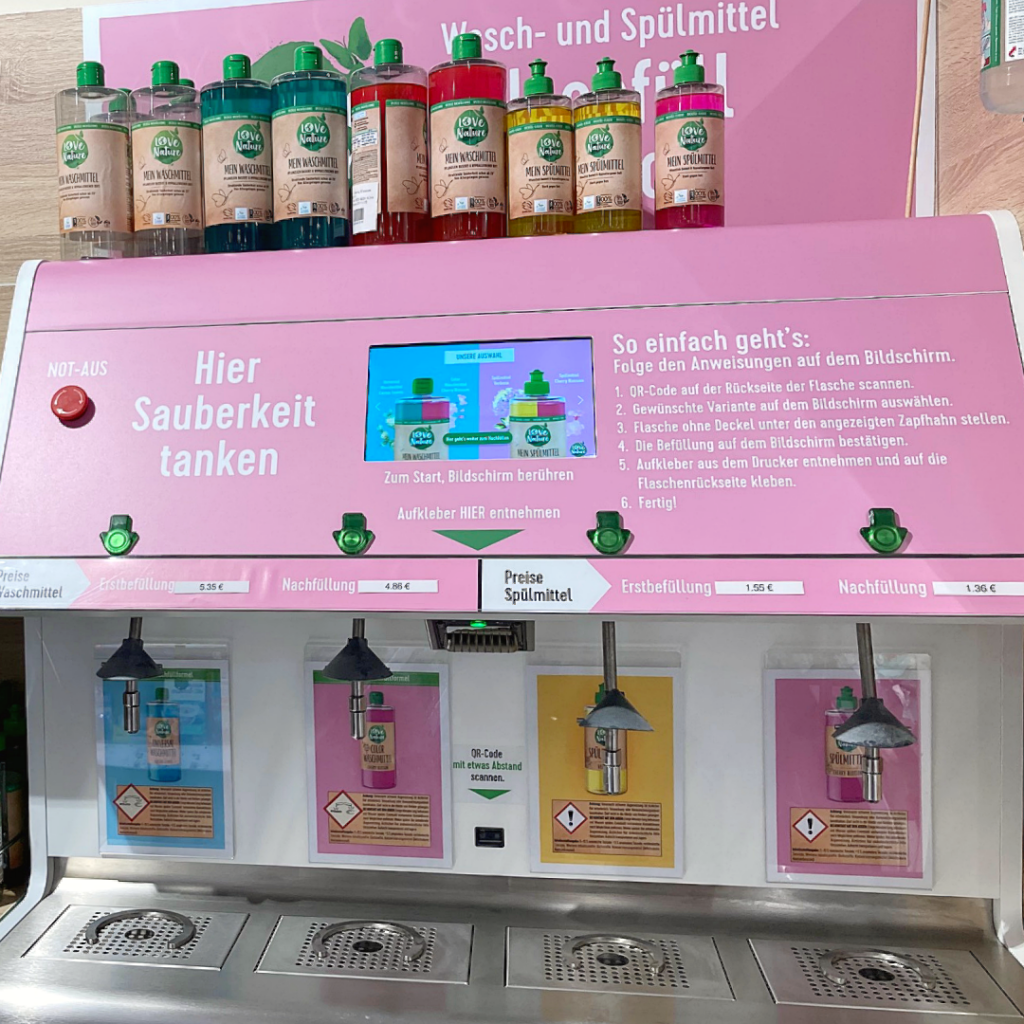
How does BUDNI react to products that are judged to be harmful to the environment?
The signpost provides information about the environmental friendliness of products. Only products identified with the signpost labels have met the conditions to be classified as a more sustainable option. A few product groups are excluded from the assessment. We asked: Are products without the signpost mark taken out of the BUDNI range? This is not necessary, explains Wöhlke. „We don’t claim to have an imperative attitude towards the customer, according to the motto: We tell you what is good and what is not good! In the end, we believe that every customer, if he is appropriately educated, will make the right decision for himself.“ In this way, the customer has a concrete influence on the assortment. In other words, education and transparency instead of paternalism. This attitude is also valid and sensible vis-à-vis the manufacturers, he says. „If the demand for a certain product suddenly decreases, they automatically ask themselves why.“ When evaluating products, the transparency of the supply chain also plays an important role. In some cases, products without signposts are not even unecological, explains Wöhlke, the manufacturers just do not make an effort to provide proof in the supply chain and thus do not fulfil the criteria.
The dialogue offer
„We want to tread the path together with the manufacturers and the customers and not do it by separating or excluding them. The new concept is a dialogue offer. Products that are not as sustainable in comparison should not be excluded; instead, BUDNI relies on the natural selection through the purchasing decisions of the customers. „In the end, a sustainable assortment has to prove itself on the market, just as other assortments have to. That is the principle of the market economy. One thing should not be forgotten, explains Wöhlke: „If certain products that customers want are no longer offered by us, they will buy them somewhere else and there is no way for us to take this customer with us on the path to more sustainable consumption.“
And what about the plastic packaging?
Plastic consumption in the store is still relatively high, just as in other branches and drugstore chains. When asked if there were any goals regarding the avoidance of packaging, Wöhlke took it in his stride for the time being and emphasised its frequent necessity: „Many products are not at all durable or transportable without packaging.“ The topic of resource conservation and the recyclability of products is nevertheless of great importance for the BUDNI shops, he said. This can be seen, for example, in the new filling station for washing-up liquid and detergent. A counter at the station shows: Within four months, for example, 5,000 detergent portions have already been filled.
What we are particularly interested in is the handling of chemicals of concern. How does BUDNI deal with this issue?
Products such as decorations, household utensils or children’s toys may contain hazardous chemicals or so-called „chemicals of concern“ according to EU directives. BUDNI follows the legal guidelines that have emerged at EU level. „BPA, for example, has not been included in cash register receipts and children’s products for years,“ the managing director tells us.
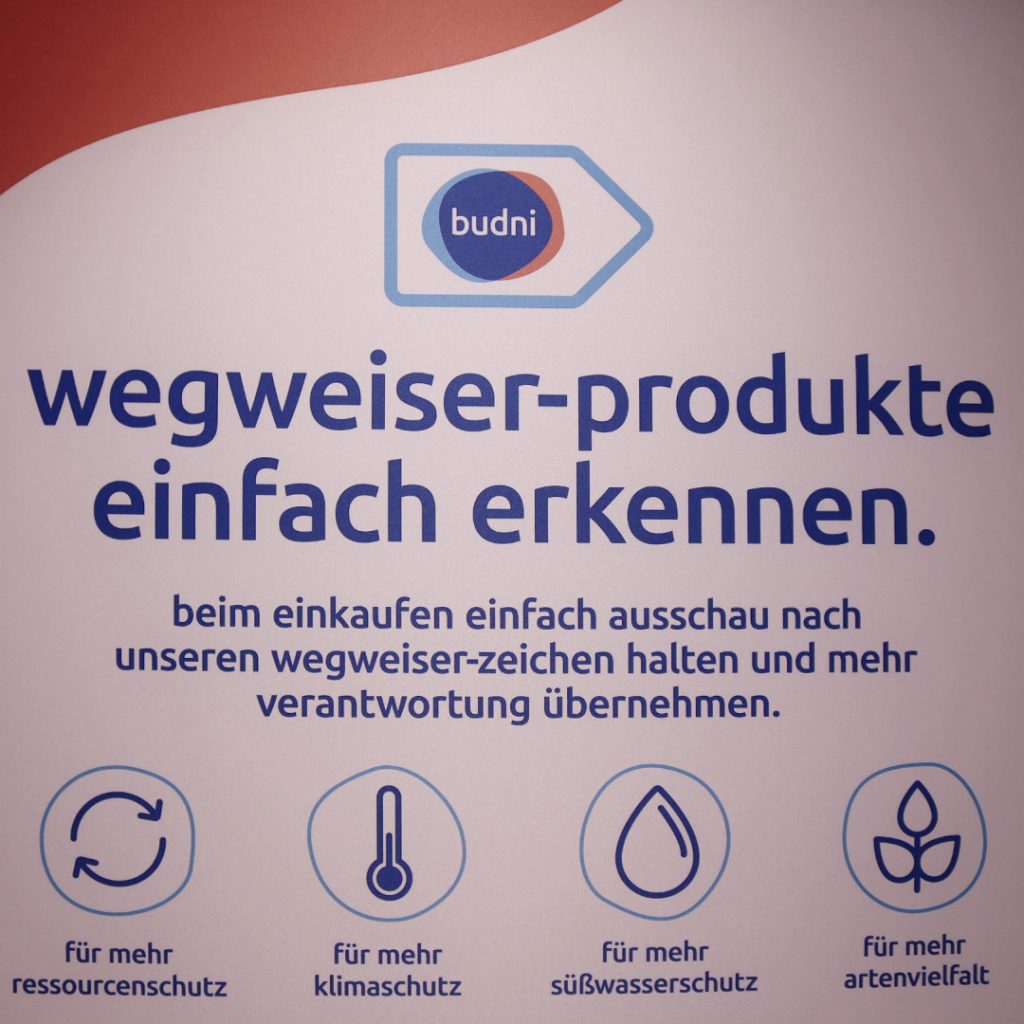
Our conclusion
BUDNI has created an innovative and sustainable concept in the context of today’s time. More and more people want sustainable products, but do not have the expertise to make differentiated decisions. Most of the time, customers‘ decision-making is based on the manufacturer’s promotion of a product. Many companies see an advantage in this and engage in „greenwashing“ to convince the buyer of supposedly sustainable products. A 100 percent sustainability of products is difficult or even impossible to achieve. However, the new signpost in BUDNI shops creates a high level of transparency in shopping, which should actually be standard, as it facilitates a more sustainable purchasing decision.
The topic of hazardous chemicals is still assigned less importance in the new concept compared to other sustainability criteria. BUDNI relies on the legal guidelines. In our view, there is still room for improvement in this area, as the guidelines for hazardous chemicals are too lax. Moreover, legal limits are often exceeded because there are not enough controls. As a result, hazardous chemicals enter our bodies and our environment. We hope that the topic of chemical management will play a more important role in the assessment in the future, because overall we see great potential in BUDNI’s new signpost system!

